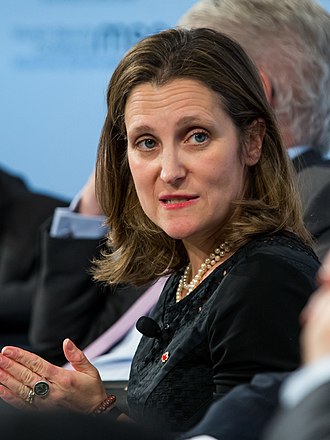Although I have lived in the United Kingdom for eight years, I continue to follow Canadian politics. As we move towards what we hope will be a post-pandemic world, there are also less personal reasons to consider the Canadian response. Canada has the most progressive – or at any rate, least reactionary – national government among the G7 countries. Although its Liberal Party lacks a Parliamentary majority, the slightly more left-leaning New Democrats have indicated that they will not trigger an election in the midst of a pandemic, thus giving the Liberals a temporary functional equivalent of a majority. More importantly and improbably, in her previous life as an accomplished business journalist finance minister Chrystia Freeland (the counterpart to the UK’s Chancellor of the Exchequer) published an award-winning book called Plutocrats: The Rise of the New Global Super-Rich that described in considerable detail the emergence of the new millennium’s hyper-inequality. If we leave aside most of the country’s stumble-bum public health response to the pandemic [i] – and Canada is hardly alone in that regard – Canada’s first pandemic-era budget, released on 19 April with the uplifting title A Recovery Plan for Jobs, Growth, and Resilience, might therefore provide a useful indicator of just how far the Overton window of political feasibility has shifted in the direction of reducing that hyper-inequality.

The answer is: not much. The budget includes numerous, and laudable, incremental increases in federally provided social supports and reiterates, without specifics, an important long-standing commitment to pursue a national subsidised child-care programme of a kind that has long been in place in Québec province. Like many other aspects of social policy, this is a political minefield in the decentralised Canadian federation because of reflexively and zealously guarded provincial jurisdiction over health care, employment law (most of Canada’s provinces have refused to implement even minimal requirements for statutory sick pay) and social programming. Except when invoking emergency powers, which it has avoided, the federal government can do little more than write cheques with few strings attached to ensure accountability for their use. Where the federal government has far more policy space to reduce inequality is in the area of tax policy, where the budget is a virtual vacuum.
The major tax policy change in the budget that is specifically targeted at reducing inequality is a symbolic surtax on luxury cars and boats. This tax is estimated to bring in C$604 million in revenue (£350 million) over the next five years. By contrast, the budget takes no steps to raise the marginal income tax rate (the tax on every unit of additional income) paid by top-income taxpayers. It is also silent on the taxation of wealth, although research from the Canadian Centre for Policy Alternatives shows that Canada’s billionaires increased their wealth by C$78 billion (about £45 billion) in the year since the start of the pandemic. To put that into perspective, the amount is slightly more than the government of Ontario, Canada’s largest province, plans to spend on health care (C$69.8 billion) in 2021-22. Likewise, the budget does nothing to address the long-standing preferential treatment of capital gains on asset sales, which are taxed at half the rate paid on wage and salary income – a tax preference that overwhelmingly benefits corporations and the richest individual taxpayers. According to Canada’s admirable tax expenditure accounts, the finance ministry estimates revenue losses from this provision at C$19.7 billion (£11.4 billion) in 2021 alone. The complete exemption from tax of capital gains on the sale of principal residences, which in much of Canada have skyrocketed in value over the past year, is estimated to cost the treasury C$7.7 billion (£4.5 billion) in 2020-21 – or twice that amount were the generic tax preference on capital gains to be contemporaneously eliminated. All these figures are probably underestimates, given recent increases in share and property prices.
There are now so many property-rich Canadians that trying to tax unearned gains on their principal residences would probably provoke a coup d’état, but that is a post for another day.
If measures like those I’ve mentioned were implemented, tax avoidance strategies would no doubt reduce the revenue gains somewhat, as economists are quick to point out. But that isn’t the issue; the budgets of governments that choose not to strangle domestic growth and immiserate their populations will be in massive deficit for many years to come. However, Canada’s current government has not made any of the obvious commitments to reducing inequality in the building back process. Reducing inequality and its corrosive effects on health, which have been foregrounded by the Covid-19 pandemic, will never be achieved by incremental strategies of trying to level-up. This is not to minimise the value of those strategies in mitigating the worst consequences of the pandemic … and low- or zero-cost childcare, if it ever happens, could be critical to reducing gender inequalities on multiple dimensions. But mitigation is not structural change.
A columnist in Canada’s heavily business-oriented Globe and Mail newspaper (paywalled) cited poll results showing that 79 percent of Canadians support a wealth tax. That, too, isn’t the issue. Some of the best comparative political science research, from multiple, mostly high-income democracies, finds ‘remarkably strong and consistent evidence of substantial disparities in responsiveness to the preferences of affluent and poor people. Insofar as policy-makers respond to public preferences, they seem to respond primarily or even entirely to the preferences of affluent people. Indeed … the influence attributed to poor citizens is not just less than that attributed to affluent citizens, but consistently negative’ (emphasis in original).
It’s really only the plutocrats whose preferences will count, without far more radical changes in political institutions and resources than seem likely in peacetime. Plutocrats rule, OK? Health inequalities researchers must resign ourselves to that, or be far more innovative than we have been so far in coming up with ways to do something about it.
[i] Sometimes, the vacuity of that response can hardly be believed. Here is a quotation from Canada’s Deputy Chief Public Health Officer, a highly paid federal bureaucrat, as reported on 22 April in a news story on possible restrictions on travel from India, which curiously has since disappeared from most news organisations’ web sites: “‘Our minister of health, other cabinet ministers and the prime minister are very seized with it. They are having active conversations about the data and so on’, he told a news conference today. ‘I think there will be a decision or something coming forward shortly’.” In the ‘decision or something’, Canada then banned direct incoming flights from India for 30 days, but not arrivals transiting from India via a third country. The logic is curious, to say the least.

